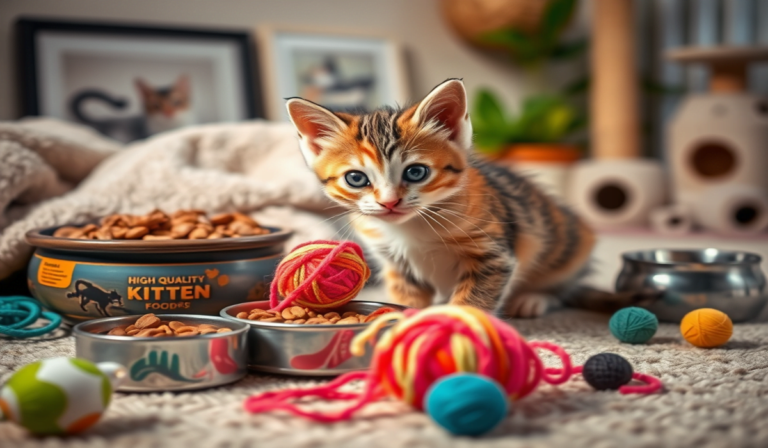New Kitten Information: how to take care of a kitten
Introduction
Congratulations on your new kitten! Bringing a kitten into your home is both exciting and sometimes stressful, especially when introducing them to other housemates.
New kitten information is crucial to ensuring your pet has a smooth transition and starts on the right paw. Below you will find several training tips, as well as healthcare information for your new kitten.
We are here to help you in any way that we can, so don’t hesitate to write any questions that you may have about your new kitten.
FeLV / FIV in Cats

FeLV (Feline Leukemia Virus) and FIV (Feline Immunodeficiency Virus) are serious viral infections in cats. FeLV can cause a variety of health issues, including anemia, lymphoma, and other blood disorders, and it can be spread through close contact, such as grooming and sharing food bowls.
FIV affects a cat’s immune system and is typically spread through bite wounds, making it crucial to monitor interactions with other cats, especially in multi-cat households. Regular veterinary care and testing are crucial to ensure your new kitten’s health and prevent the spread of these viruses.
Early detection and management can significantly improve your cat’s quality of life.
Feline Stress-Free Environment

Creating a stress-free environment for your new kitten is essential for their well-being. Provide a safe, quiet space for them to retreat to, especially during the first few days in their new home. Gradually introduce them to new areas and people, and ensure they have plenty of toys and scratching posts to keep them entertained and reduce stress.
Consistent routines and a calm environment will help your kitten feel secure and adjust more quickly. Consider using pheromone diffusers or sprays to create a calming atmosphere and reduce anxiety.
Wellness & Veterinary Care

Regular veterinary visits are vital to your new kitten’s health. Your vet will provide necessary vaccinations, deworming, and general health checks. It’s important to keep up with scheduled appointments and follow your vet’s advice on preventive care.
Vaccinations are typically given in a series, starting as early as six weeks of age, to protect against common feline diseases such as feline distemper, herpesvirus, calicivirus, and rabies. Deworming treatments help prevent intestinal parasites, which are common in kittens. Discuss with your vet about flea and tick prevention to keep your kitten free from external parasites.
Household Hazards for Cats

New kittens are curious and can get into trouble easily. Keep hazardous items such as electrical cords, small objects, toxic plants, and chemicals out of reach. Ensure that your home is kitten-proof to prevent accidents and injuries.
Secure cabinets and keep potentially dangerous substances, like cleaning products and medications, safely stored away. Be cautious with string, yarn, and small toys that could be swallowed and cause intestinal blockages.
Keep windows and balconies secure to prevent falls, and supervise interactions with other pets to avoid conflicts and injuries. For more information.
Spay Your Cat
Spaying your female cat prevents unwanted pregnancies and reduces the risk of certain cancers and infections. It’s generally recommended to spay cats before their first heat cycle, around six months of age.
Consult your vet to determine the best time for your new kitten. Spaying eliminates the risk of ovarian and uterine cancers and significantly reduces the chance of mammary tumors.
It also prevents the behavioral changes and health risks associated with repeated heat cycles. Discuss the benefits and potential risks of spaying with your vet to make an informed decision for your new kitten’s long-term health.
Feline Symptoms of health issues
Be aware of common feline symptoms that may indicate health issues, such as vomiting, diarrhea, excessive coughing or sneezing, changes in appetite or behavior, and signs of pain.
If you notice any of these symptoms in your new kitten, contact your vet immediately. Early detection and treatment of health issues can prevent complications and improve your kitten’s prognosis.
Monitor your kitten’s litter box habits for changes in urine and stool, which can indicate underlying health problems. Regularly check their coat, eyes, ears, and teeth for signs of illness or parasites, and report any concerns to your vet promptly.
Taking Your Cat to the Vets
To make vet visits less stressful, accustom your new kitten to their carrier by leaving it out and placing treats or toys inside. Use a pheromone spray or calming collar to help reduce anxiety during the trip.
Handle your kitten gently and speak in soothing tones to create positive associations with the carrier and car rides. Gradually increase the time spent in the carrier and take short trips to acclimate your kitten to travel.
Reward calm behavior with treats and praise to reinforce positive experiences, making future vet visits more manageable for both you and your pet.
Declawing Cats
Declawing is a controversial procedure and is not recommended by many veterinary professionals due to the pain and long-term behavioral issues it can cause. Instead, provide scratching posts and regularly trim your new kitten’s nails to manage scratching behavior.
There are also nail caps available that can be applied to your kitten’s claws to prevent damage to furniture and skin. Teach your kitten to use appropriate scratching surfaces by placing posts in prominent areas and rewarding them for using them.
Redirect inappropriate scratching to approved surfaces, and consider using double-sided tape or deterrent sprays on furniture to discourage scratching.
Routine Vet Visits for Cat
Routine vet visits are essential for maintaining your new kitten’s health. These visits allow your vet to monitor your kitten’s growth, administer vaccinations, and provide preventive care to avoid future health issues.
Your vet will also perform thorough physical exams to detect any potential problems early. Regular wellness checks help establish a baseline for your kitten’s health, making it easier to identify changes or concerns. Schedule annual or bi-annual visits as recommended by your vet, and keep a record of all medical treatments, vaccinations, and health issues for reference
Feline Wellness Plan
Ensure your new kitten receives proper nutrition, regular exercise, and mental stimulation to promote overall wellness. Play with your kitten daily and provide a variety of toys to keep them active and engaged.
Interactive toys, puzzle feeders, and climbing structures can help satisfy their natural hunting instincts and prevent boredom. Encourage physical activity to support healthy development and maintain a healthy weight.
Socialization is also crucial for your kitten’s emotional well-being. Introduce them to different people, animals, and environments in a controlled and positive manner to build their confidence and adaptability.
Dental Care for Cats
Dental health is crucial for your new kitten’s overall well-being. Brush your kitten’s teeth regularly with a pet-safe toothpaste and provide dental treats or toys to help keep their teeth clean. Regular dental check-ups with your vet are also important.
Poor dental hygiene can lead to plaque buildup, gum disease, and tooth loss, as well as systemic health issues. Start a dental care routine early to get your kitten accustomed to having their teeth brushed. Use a soft-bristled brush and gentle techniques to make the experience positive.
Consult your vet for recommendations on dental products and professional cleanings.
Nutrition for Cats
Feed your new kitten a balanced diet for their age and developmental needs. High-quality commercial kitten food provides the necessary nutrients for growth and development.
Avoid feeding table scraps or foods harmful to cats, such as chocolate, onions, and garlic. Ensure that your kitten has access to fresh water at all times. Consult your vet for specific dietary recommendations based on your kitten’s breed, size, and health status.
Monitor their weight and adjust feeding amounts as needed to maintain a healthy body condition. Transition to adult cat food around one year of age, following your vet’s guidance.

Kitten Nutrition: Why Adult Cat Food Isn’t Suitable
If your kitten eats your older cat’s food, there could be some potential nutritional concerns. Kitten food is specially formulated with higher levels of protein, fat, and certain nutrients essential for growth and development, while adult cat food is designed to meet the needs of mature cats. If a kitten consumes adult cat food regularly, they might not receive the necessary nutrients they require for healthy growth, potentially leading to malnutrition or stunted growth over time. It’s important to monitor your kitten’s diet and ensure they are eating food formulated specifically for their age.

Conclusion:
Welcoming a new kitten into your home is a joyful and rewarding experience, but it also comes with responsibilities. Providing proper care, a balanced diet and regular veterinary check-ups are essential to ensure your kitten grows up healthy and happy.
Creating a stress-free environment, monitoring for health issues, and establishing a routine can help your kitten adjust smoothly to their new surroundings. By following the tips provided, you can lay the foundation for a loving relationship and a long, fulfilling life for your new furry friend. Remember, your vet is a crucial partner in your kitten’s journey, so don’t hesitate to reach out with any questions or concerns.







